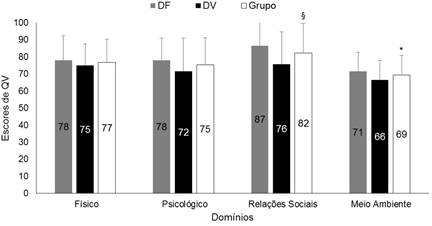ABSTRACT
Paralympic sport has grown significantly in recent years, andtherefore, is important to evaluate the sleep and the quality of life of these athletes, which can influence their performance. The objective of the study was to verify if there is a difference in perceptions of sleep and quality of life among Paralympic athletes, two months before the London Paralympic Games. A total of30 athletes with physical disability (18 athletes) and visual impairment (12 athletes) were evaluated. The Pittsburgh questionnaire, the Epworth scale and the WHOQOL-bref, respectively, were used to assess subjective sleep quality, somnolence and quality of life (QOL). For comparison between disability groups were used the Mann-Whitney test. To verify differences between the domains of QOL, the Friedman test was used, followed by the Wilcoxon test. The association between nominal variables was analyzed by the Chi-square test. There was a predominance of athletes with sleep efficiency >85%. There was no difference between the groups in the comparison of perception of the quality of sleep. The domain "environment" showed lower scores compared to the other domains, while the domain "social relations" showed lower score compared to the "psychological". There was no difference in the sleep and life between disabilities.
Keywords:
Sleep; Quality of life; Disabled Athlete; Paralimpyc.

 Thumbnail
Thumbnail
 Fonte: Os autores
Fonte: Os autores